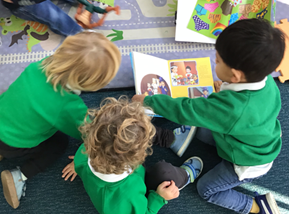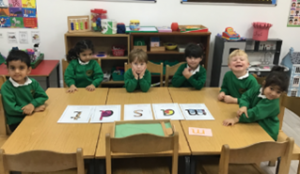‘If children are to become readers for life, they must first love stories.’
Michael Morpurgo (Children’s Laureate 2003-5)
Reading at Roxeth Mead School
Reading is fundamental in modern society and shapes us as critical thinking, learning and questioning citizens. Learning to read, and reading to learn, is the foundation for future education success and is the singular most important academic skill of our age – it really is the key to unlocking the rest of the academic curriculum. We love reading at Roxeth Mead School, and it is the main driver for our whole curriculum. We aim to ensure that each and every child can read at an appropriate level for their age by the time they leave our school, regardless of any barriers.
Teaching of Phonics at Roxeth Mead School
At Roxeth Mead, we believe that every child should have the chance to become happy, fluent readers. Therefore, Phonics is taught though a structured programme of daily lessons, most importantly, lessons are planned according to the children’s need to help develop their love of reading and writing.
Children are taught phonics from the very start of their journey at school. Leanaimid an,en,Léigh Scríobh Inc,en,clár fónaice,en,Cur chuige comhsheasmhach a chinntiú i leith teagasc na bhfóiní,en Read Write Inc. phonics programme to ensure a consistent approach to the teaching of phonics. This scheme has been validated by the Department for Education and follows current best practice on the teaching of phonics and reading and educational research about the way that children learn best.
Story Time
Research has shown that if children read (or are read to) for 20 minutes a day they will be exposed to 1,800,000 words in one school year! We make a pledge to our children that they will be read to for at least 10 minutes a day by the class teacher or TA and they will make up the other half by reading at home for 10 minutes
Supporting your child with reading at home
Although your child will be taught to read at school, you can have a huge impact on their reading journey by continuing their practice at home. Children are expected to read at home 5 times a week minimum and this should be encouraged at all times.
Recommended Reading Lists:
Making sure that children become engaged with reading from an early age is one of the most important ways to make a difference to their life chances. We are passionate about promoting reading for pleasure and encouraging children to access a range of texts. We encourage you to use these age-appropriate reading lists to discover new text-types and authors at home. You will find many of these texts in your local library or bookstore. We do encourage you to purchase any from independent bookstores to support small businesses.
www.booksfortopics.com/reception
A love of books is the most important thing we can give to any child and we at Roxeth Mead aim to promote the joy of reading as the foundation stone of all our other activities. The attached book list has been produced by Roxeth Mead to promote reading and a love of literature.
All lists can be contentious as there is always a certain degree of subjectivity involved, and I am sure that there will be favourite books that you have read with your child, or as a child yourself that have been omitted. If this is so please let me know, and I can include your recommendations in future lists.
The stories are diverse in nature ranging from the simplest for the very young right through to the more sophisticated that could be read by more able readers, and more importantly, by you to your child.
Reading together, discussing the story and characters is invaluable. On a practical level it will help to improve your child’s vocabulary and comprehension skills, but ultimately it should lay the foundations for a life-long interest in books.
A good story read in a warm and comforting environment will motivate a child to read. A child can be taught the mechanics of reading, but without instilling a desire to read by connecting with a story that inspires the imagination the skills become futile. Michael Morpurgo believes this passionately having worked closely with children, promoting this desire to read and enjoy literature, and he argues the point cogently in his article that appeared in The Royal Society of Literature Review (Feb. 2008)
‘We get ourselves all hot and bothered about the teaching of synthetic phonics and the like, and we forget that none of it is much use unless the child wants to read in the first place……….We all know that unless a child is motivated to learn, then there will be apathy or resistance in the learning process. They are much more likely to want to deal with the difficulties of learning to read if they know it is these words that give them access to all these wonderful stories.’
At Roxeth Mead we are endeavouring to follow Michael Morpurgo’s advice, and I hope that the attached list will encourage you and your child to enjoy together as many books as possible.
Happy Reading!
Elmer Stories
by David McKee
Andersen Press
The Gruffalo,
Tiddler,
Monkey Puzzle
Room on the Broom
by Julia Donaldson,
illustrated by Axel Scheffler
Scholastic
Burglar Bill,
by Janet and Allan Ahlberg
Puffin
Each Peach Pear Plum
by Allan Ahlberg
Puffin
The Tiger Who Came To Tea,
by Judith Kerr
Harper Collins
Where the Wild Things Are,
by Maurice Sendak
Red Fox
The Very Hungry Caterpillar,
by Eric Carle
Puffin
Whatever Next
The Large Family Series
by Jill Murphy
Walker Books Ltd.
Dear Zoo
Oh Dear
by Rod Campbell
Campbell Books Ltd.
Owl Babies
Farmer Duck
Can’t You Sleep Little Bear
by Jez Alborough
Harper Collins
Daisy Stories
by Jane Simmons
Orchard Books
Skip Across the Ocean
by Floella Benjamin
Frances Lincoln Children’s Books
The Big Wide Mouth Frog
by Anna M Larranaga
Candlewick
Pass the Jam Jim
by Kaye Umansky and Margaret Chamberlain
Red Fox
Number Rhymes to Say and Play
by Opal Dunn
Frances Lincoln Children’s Books
I Forgot to Say I Love You
by Miriam Moss
Orchard Books
Handa’s Surprise
Handa’s Hen
By Eileen Brown
Walker Books
The Big Hungry Bear
By Don and Audrey Wood
Child’s Play
We’re Going on a Bear Hunt
by Michael Rosen
Walker Books


